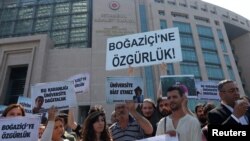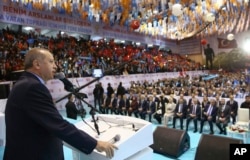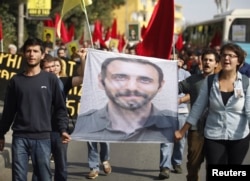In an Istanbul courthouse, 22 students from one of Turkey's elite universities went on trial Wednesday on terrorism charges. The case has become a focal point in growing criticism of an ongoing legal crackdown under emergency rule.
"As the families of these Bogazici [Bosphorus] students, we now know very well that they are no longer our children only, but the children of those who want peace and democracy in Turkey, who want freedom and autonomy in universities," Bulent Yilmaz, the father of one jailed student, said while addressing supporters and family members gathered ahead of the hearing.
The Bosphorus University students were arrested for organizing a counterprotest aimed at supporters of a Turkish military operation in Syria against the YPG Syrian Kurdish militia. Fourteen of those arrested have been jailed for nearly 70 days. According to the students' lawyers, some were subject to police beatings and abuse.
'Shameful'
"This is shameful that we are going through this experience," said professor Can Candan of Istanbul's Bosphorus University, speaking outside the court. "These students that have peacefully protested have been declared terrorists without trial, unjustly. They just expressed their opinions, and they are free to do that under our own constitution."
With prosecutors demanding up to seven years in jail for supporting a terrorist organization, many of the students in court looked shaken by events.
One student, appearing to be holding back tears, pleaded with the judge to be freed in order to graduate. All the detained students were released by the court under judicial control, with the case adjourned until October 3.
Critics say the case is politically motivated. The arrests followed President Recep Tayyip Erdogan's speech labeling the students terrorists for protesting the military operation in Syria. The United States has backed the YPG in the fight against Islamic State. Ankara has linked the YPG to the outlawed PKK Kurdish rebel group, which has been waging an insurgency in southeastern Turkey. Turkey has labeled the PKK a terrorist organization.
The defendants say Bosphorus University is the president's real target. "Erdogan is trying to impose his ideology on the youth. That is why they are targeting a liberal university," said a student attending the court proceedings. "This university is a liberal-rooted university, and it was an American college before, so we had comparatively liberal politics. With the arrests of the students and even our academics [teachers] and the presence of the undercover police on campus, now everyone feels pressure and anxiety."
Past immunity
Bosphorus is one of Turkey's top colleges, and analysts say its status had given it some immunity to past legal crackdowns. During military rule in the 1980s, it remained a beacon of liberalism. In the 1990s, the university was one of the few institutions that did not enforce a religious headscarf ban on students.
Erdogan has recently repeatedly targeted the university as a center of subversion, fueling suspicions that politics lie behind the crackdown.
"Bosphorus is a symbol for progressive democratic values; it's a university much more democratic and free than many other universities in Turkey. It's not a coincidence that Bosphorus has been targeted," Candan said. "The student arrests are not the only thing facing the university. We have the trials of academics of peace going on; we have close to 100 academics facing trial for signing a peace petition. We've been criminalized for calling for peace."
Candan and nine colleagues are due in court Thursday for having signed a petition that calls for an end to the war against the PKK. Hundreds of other academics across the country are also on trial.
The Bosphorus University situation is part of the broader legal crackdown implemented after a 2016 coup attempt. Under emergency rule introduced after the botched military takeover, nearly 100,000 people were detained, and many more were fired from their jobs, including a number of academics.
'Hands off' university
"This court case is actually a sign of how all the liberties are restricted," undermining Turkey's laws, said parliamentary deputy Binnaz Toprak of the main opposition party, the CHP.
"Take your hands off Bosphorus University; take your hands off our students," added Toprak, who once taught at the school.
Abolishing emergency rule is a shared pledge of all the opposition parties and presidential challengers in the presidential and parliamentary elections set for June 24.
Emergency rule gives the president sweeping powers and suspends many legal rights.
"The polls do show the majority of Turks do want emergency rule lifted, around 65 percent," said Sinan Ulgen, head of the Istanbul-based Edam research institution. "This is not the normal state of affairs as the name indicates; it is something extraordinary. People want to go back to normalcy. Fatigue may be a factor [for voters], but much more so is the economy."
Erdogan continues to robustly defend the need for emergency rule, arguing conspirators behind the failed coup still threaten democracy and that the country is continuing to fight the Kurdish rebels.






